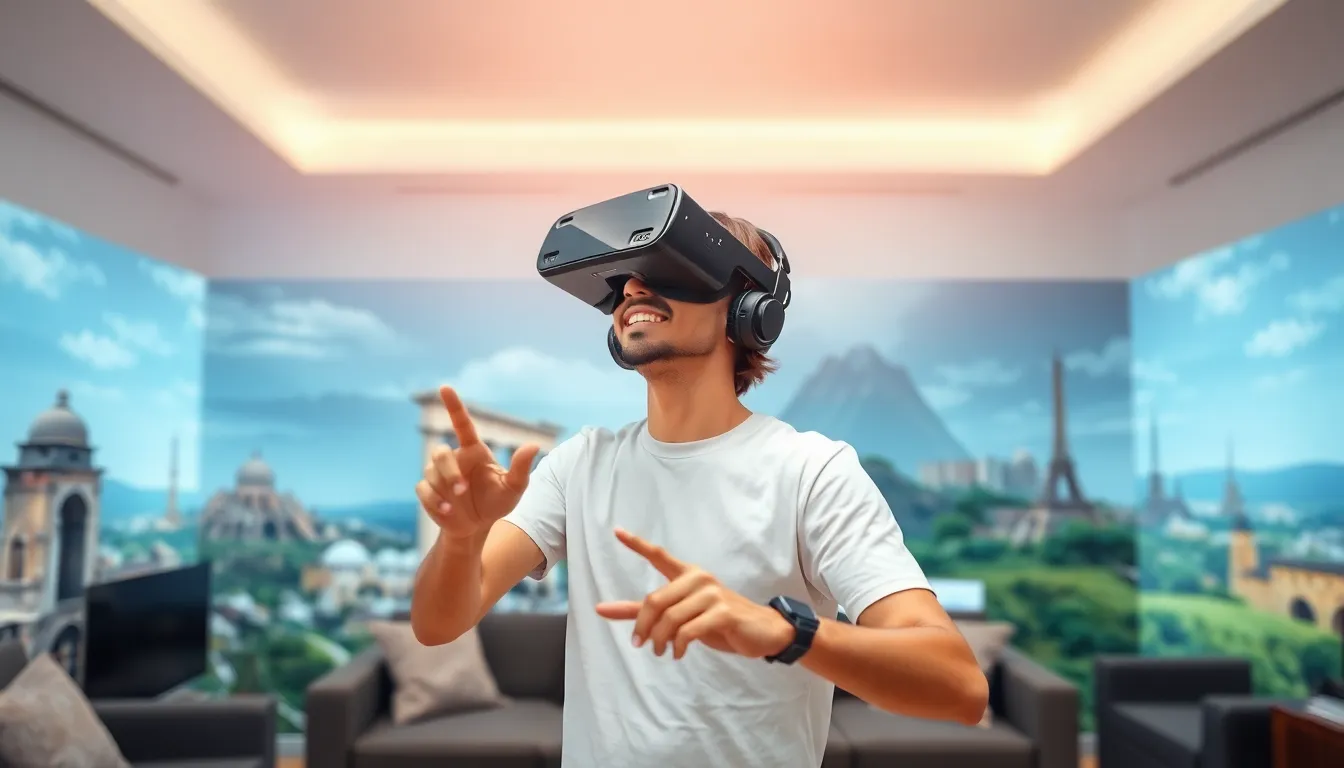Table of Contents
ToggleImagine jetting off to the stunning beaches of Bali or exploring the ancient ruins of Rome without ever leaving your couch. With VR travel experiences, the world’s your oyster, and you don’t even need to pack a suitcase. This innovative technology transports travelers to breathtaking destinations, all while avoiding the hassle of airport security and overpriced snacks.
Overview Of VR Travel Experiences
VR travel experiences offer a unique way to explore the world without leaving home. This innovative technology immerses users in stunning environments, such as the beaches of Bali or the historic streets of Rome. Through headsets and applications, travelers can experience breathtaking landscapes, famous landmarks, and even local culture.
Education and exploration go hand in hand with VR travel experiences. Museums, art galleries, and cultural festivals create engaging environments for users. They can learn about different cultures, customs, and histories all from their living rooms. Virtual classes, guided tours, and expert commentary enhance the educational aspect of these experiences.
Accessibility plays a significant role in the growth of VR travel. Travelers with disabilities or those facing financial constraints find opportunities to discover new destinations. Reduction in travel costs and avoidance of logistical hurdles make exploring the world more inclusive.
Additionally, social interaction enriches VR travel experiences. People can share their adventures with friends or family, fostering connections. They can meet fellow travelers in virtual spaces, exchange tips, and discuss their experiences.
The industry sees continued advancements in technology, improving the quality of VR experiences. Enhanced graphics, more realistic audio, and advanced motion tracking provide users with lifelike sensations. Companies continually develop new content, expanding the variety of virtual destinations.
Lastly, VR travel experiences aren’t just a passing trend. They hold the potential to become an integral part of how individuals view travel, offering sustainable and economical alternatives. Engagement with technology will further shape the way travelers experience the world, paving the way for future innovations.
Benefits Of VR Travel Experiences

VR travel experiences offer diverse advantages that appeal to users across various demographics. The technology’s immersive nature and robust accessibility transform how individuals engage with the world.
Immersive Engagement
Immersive engagement captures travelers’ attention like never before. Users experience stunning visuals that replicate real-world environments with unparalleled realism. They interact with famous landmarks and cultural elements through lifelike simulations. Daring explorations become possible as they walk through ancient ruins or glide above iconic landscapes. Enhanced audio design adds to the sensory experience, making it feel as if they truly inhabit the space. High-quality graphics pull viewers deeper into the scene. Emotionally resonant experiences allow users to connect with locations on a personal level. As they engage with local customs and traditions, the learning journey becomes enriching.
Accessibility
Accessibility expands travel opportunities for diverse audiences. Individuals with physical disabilities find comfort exploring new places without limitations. Financial constraints often deter potential travelers; however, VR travel eliminates expensive airfare and accommodation costs. It levels the playing field, ensuring everyone can discover captivating destinations. Families can visit multiple cities in a single day, maximizing experiential learning. Inclusive design features accommodate various abilities, allowing seamless navigation. VR’s ability to simulate different environments suits different preferences and comfort levels. This technology empowers users to embark on adventures that might otherwise be impossible. With VR travel experiences, the world becomes a more inclusive and reachable space for all.
Popular VR Travel Platforms
VR travel platforms transform the way individuals explore the world. Numerous options deliver unique experiences, making it easy to choose one that fits personal interests.
Platform 1: Overview
Oculus Venues offers live events in stunning environments. Users can attend concerts, sports, and cultural events in real-time, enhancing social interaction. The platform utilizes high-quality graphics and immersive audio, creating a lifelike experience. People connect with others around the globe by enjoying events from the comfort of home. Accessibility features cater to diverse audiences, ensuring everyone can participate. With regular updates, Oculus Venues continues to expand its offerings, making it a preferred choice for virtual travel.
Platform 2: Overview
Wander showcases 360-degree videos of famous destinations. Users can explore cities like Paris and Tokyo without leaving their homes. The platform emphasizes user engagement through a variety of travel experiences. Accessibility remains a priority, allowing users of all backgrounds to discover new cultures. Guided tours and user-generated content enhance the learning experience. Through Wander, individuals gain insights into local customs and traditions, further enriching their virtual journeys. Continuous updates ensure an evolving library of experiences, making Wander a standout VR travel platform.
Limitations Of VR Travel Experiences
VR travel experiences come with specific limitations that may hinder their effectiveness despite technological advancements.
Technical Challenges
Technical challenges often impede the overall quality of VR travel experiences. Users might encounter issues like latency, which can disrupt immersion during exploration. Hardware limitations, such as insufficient processing power or outdated headsets, affect the realism of virtual environments. Software bugs may cause glitches that break the immersive experience, leading to frustration. Content availability can pose another obstacle. Developers constantly work to expand libraries, but not all destinations and scenarios find representation in VR. Enthusiasts may experience variations in graphic quality, impacting engagement. These challenges remind users that while VR is innovative, it still requires refinement.
Lack of Physical Presence
A lack of physical presence remains a significant drawback of VR travel experiences. Users cannot physically interact with their surroundings, which diminishes the sensory aspects of travel. Scents, sounds, and tactile sensations contribute to the full experience of a destination; VR cannot replicate this. Cultural immersion suffers when users view sights through a screen instead of engaging directly with local communities. Emotional connections often form through human interaction and real-world experiences, and VR lacks that depth. This absence can limit the overall enjoyment and fulfillment derived from virtual explorations.
Future Of VR Travel Experiences
Emerging technologies continue to propel the future of VR travel experiences, enhancing immersion and accessibility. Enhanced graphics, sound quality, and user interaction mechanisms represent significant advancements, creating more realistic environments. Immersive audio technologies contribute realism, allowing users to hear local sounds and interact with elements in simulated spaces.
Innovative platforms are expanding their offerings. Oculus Venues is set to grow, incorporating global events that enhance social experiences for users. Wander focuses on user-generated content, inviting travelers to contribute their perspectives, thereby enriching the platform’s diversity.
Educational applications will likely become more prominent as developers create targeted experiences for schools and institutions. Virtual reality museums could replicate artifacts and art, allowing students to engage with history and culture without traveling.
Accessibility will continue to improve. Companies are focusing on inclusive designs that cater to users with disabilities, ensuring that everyone can explore destinations. Financially constrained individuals will gain memorable experiences without costly travel arrangements.
Environmental considerations will emerge as more users turn to VR travel as a sustainable alternative. Utilizing this technology can reduce the carbon footprint associated with traditional travel, contributing to eco-friendly tourism.
Cultural exchange through VR travel may transform how people connect. Future experiences might facilitate direct interactions between users and local communities, fostering understanding and appreciation of different customs.
Technical advancements remain essential. Developers need to address existing limitations, such as latency and hardware requirements, to enhance overall experience quality. Refining these aspects could lead to greater emotional engagement, vital for connecting users to the travel experience.
VR travel experiences are revolutionizing how individuals explore the world. By providing immersive environments and educational opportunities, this technology breaks down barriers that often limit travel. Users can enjoy breathtaking landscapes and cultural insights without the logistical challenges of traditional travel.
As advancements in VR continue, the potential for deeper emotional connections and enhanced social interactions grows. Platforms like Oculus Venues and Wander are leading the charge by offering engaging content that caters to diverse audiences.
While challenges remain, the future of VR travel looks promising. It not only offers a sustainable alternative to physical travel but also fosters cultural appreciation and understanding. As technology evolves, VR travel experiences are set to become an integral part of the global exploration landscape.




